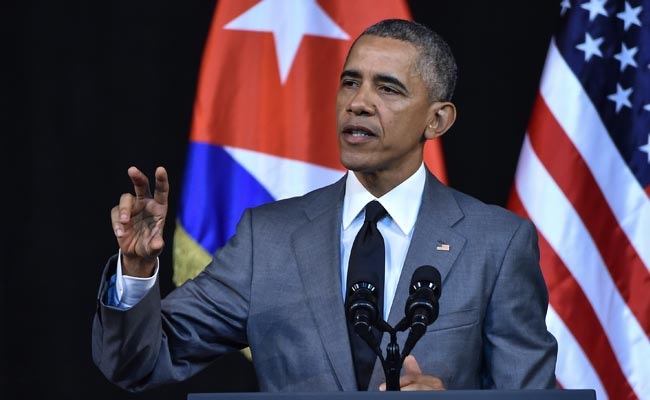
Barack Obama's address marked the final day of his trip, the first by a U.S. president to Cuba in 88 years. (AFP photo)
Havana:
U.S. President Barack Obama delivered an impassioned appeal for political liberties in Cuba, including freedom of expression and religion, as he spoke directly to the Cuban people in a historic speech broadcast throughout the Communist-ruled island.
Speaking at Havana's Grand Theater with Cuban President Raul Castro in attendance in what White House officials touted as a crowning moment of Obama's visit, Obama extended a "hand of friendship." He declared that he had come to Havana to "bury the last remnant" of the Cold War in the Americas.
But he also pressed for economic and political reforms, speaking in a one-party state where little dissent is tolerated.
"Voters should be able to choose their governments in free and fair elections," he said, describing this as consistent with what the United States wants for countries around the world.
"Not everybody agrees with me on this, not everybody agrees with the American people on this but I believe those human rights are universal. I believe they're the rights of the American people, the Cuban people and people around the world," Obama said.
Obama's address marked the final day of his trip, the first by a U.S. president to Cuba in 88 years. His presence in Havana was the culmination of a diplomatic opening that he and Castro announced in December 2014, ending decades of estrangement between Washington and Havana.
He drew strong applause from the audience when he reiterated his call for an end to the longstanding U.S. economic embargo against Cuba, which only the U.S. Congress can lift.
Obama, who abandoned a longtime U.S. policy of trying to isolate Cuba, wants to make his shift irreversible by the time he leaves office in January and secure it as a piece of his foreign policy legacy.
But major obstacles remain to full normalization of ties, most notably the continuing U.S. embargo and differences over human rights.
The president's critics at home said his visit was a premature reward to the Castro government.
With his words carried live by Cuba's state-run media, Obama sought to persuade ordinary Cubans that his new policy, including easing of U.S. trade and travel restrictions, was focused primarily on helping them to improve their lives.
He sought to lay out a hopeful vision of future U.S.-Cuban relations. On Monday he sparred with Castro at a news conference where both leaders aired some of the old grievances between their countries, even as they sought to advance the diplomatic thaw.
(This story has not been edited by NDTV staff and is auto-generated from a syndicated feed.)
Speaking at Havana's Grand Theater with Cuban President Raul Castro in attendance in what White House officials touted as a crowning moment of Obama's visit, Obama extended a "hand of friendship." He declared that he had come to Havana to "bury the last remnant" of the Cold War in the Americas.
But he also pressed for economic and political reforms, speaking in a one-party state where little dissent is tolerated.
"Voters should be able to choose their governments in free and fair elections," he said, describing this as consistent with what the United States wants for countries around the world.
"Not everybody agrees with me on this, not everybody agrees with the American people on this but I believe those human rights are universal. I believe they're the rights of the American people, the Cuban people and people around the world," Obama said.
Obama's address marked the final day of his trip, the first by a U.S. president to Cuba in 88 years. His presence in Havana was the culmination of a diplomatic opening that he and Castro announced in December 2014, ending decades of estrangement between Washington and Havana.
He drew strong applause from the audience when he reiterated his call for an end to the longstanding U.S. economic embargo against Cuba, which only the U.S. Congress can lift.
Obama, who abandoned a longtime U.S. policy of trying to isolate Cuba, wants to make his shift irreversible by the time he leaves office in January and secure it as a piece of his foreign policy legacy.
But major obstacles remain to full normalization of ties, most notably the continuing U.S. embargo and differences over human rights.
The president's critics at home said his visit was a premature reward to the Castro government.
With his words carried live by Cuba's state-run media, Obama sought to persuade ordinary Cubans that his new policy, including easing of U.S. trade and travel restrictions, was focused primarily on helping them to improve their lives.
He sought to lay out a hopeful vision of future U.S.-Cuban relations. On Monday he sparred with Castro at a news conference where both leaders aired some of the old grievances between their countries, even as they sought to advance the diplomatic thaw.
© Thomson Reuters 2016
(This story has not been edited by NDTV staff and is auto-generated from a syndicated feed.)
Track Latest News Live on NDTV.com and get news updates from India and around the world

